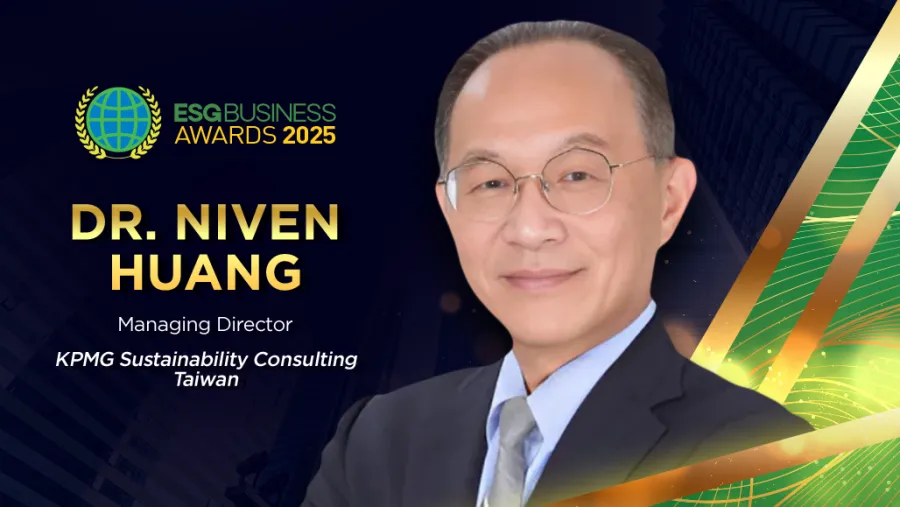
Top-down governance powers ESG integration at every level – KPMG’s Dr Niven Huang
Huang emphasises strategic integration, executive accountability, and triple bottom line thinking as critical drivers of sustainable transformation.
As global markets face mounting ESG pressures, businesses across Asia Pacific are being compelled to rethink their core strategies and redefine success beyond traditional financial metrics.
Offering his invaluable insight is Dr Niven Huang, Managing Director of KPMG Sustainability Consulting in Taiwan and former Head of ESG for KPMG Asia Pacific. Widely recognised as a pioneer in corporate sustainability across the region, Dr Huang has played a pivotal role in advancing CSR, sustainability reporting, sustainable finance, and carbon management. His insights are deeply informed by both professional practice and academic engagement, having served as an associate professor in Taiwan’s top MBA programmes since 2008 and, more recently, as an adjunct professor at the School of Banking and Finance at National Sun Yat-sen University.
As a judge for the ESGBusiness Awards 2025, Dr Huang discussed the shift from ESG compliance to strategic integration, driven by governance, innovation, and long-term value creation.
As the former Head of ESG for KPMG Asia Pacific, what fundamental shifts have you observed in how businesses in Asia Pacific perceive and prioritise ESG within their corporate strategies?
I believe the businesses in Asia Pacific pay attention to ESG and are willing to implement ESG, no doubt, at the very beginning. That is because of the fact and trend of global supply chain management. So the request from their buyer is one very important driver. The second one is: more and more Asia Pacific countries' governments already have more or less ESG-related
regulations, especially regarding reporting.
At the very beginning, a lot of Asia Pacific businesses, because of a compliance requirement, had to compile and integrate a lot of ESG data into the reporting. But several years later, more and more Asia Pacific businesses perceive that if the company does not have an effective governance and management system in place for ESG, it is not possible to drive every function, every BG, business unit within the corporate.
To walk the talk on ESG, therefore, the top-down governance is very important within the company. They’re the driving force for moving the whole corporate daily operation forward.
Then, of course, the most important is that the ESG integration into their operation and business strategy will deliver the outcome strongly related to the process of operation, the product, and service innovation. In the end, that will become ESG competence for a company, but this is very difficult. It will need the top management's buy-in. They got to have the resources, including the budget and human resources, available in the company. Then the company also need the ESG strategy followed by KPI and also an effective management system for tracking the performance.
How can companies better integrate ESG into core business models in a way that drives innovation, competitiveness, and long-term value creation?
The most important thing is that ESG should be a very important element in corporate governance. Referring to my answer to question number one, top-down governance and driving the executive committee in the daily operation, to integrate ESG into all of the business operations, is a very important part.
Secondly, the company needs to conduct the double materiality analysis, and try to identify what the most material topic is for the company to implement ESG. Then, the double materiality should be strongly related to the core competence, product, and service.
The third point is that companies need to build up an effective internal management. The Asia Pacific company has become bigger. Even lots of companies have become multinational companies. So that means they do have overseas operations, and the corporate includes very diversified investments and also touches upon quite diversified industries. They do have domestic operations, overseas operations, and even global operations.
The effective management system means there should be one very effective corporate-level governance system that can include all of the key operation centre, domestic and overseas, and also cover it—cover all of the diversified entities within the corporate to do the same thing. At the same time, following the same model of monitoring and data management and analysis system, the reporting system should also be consistent.
The third one is that all the outcomes should be directly related to the product service innovation, revenue, and the stakeholders' trust. So the company needs to monitor those kinds of KPIs related to the product service revenue, the stakeholder (especially the customer), clients' trust, and even the investor in financial institutions or rating performance.
The last point is that the corporate senior executives' compensation scheme should be directly related to the ESG KPIs performance. Money talks: no money, no talk. So this kind of integration of KPI into compensation scheme, especially focusses on senior executives, and if that kind of compensation integration system can be cascaded to the manager level, different kinds of levels, then this will really drive every department, every corporate function. They will put ESG into every function or every business unit's operation. I think this is very effective in driving the company's innovation.
How are ESG principles reshaping how companies define corporate purpose and stakeholder value in today’s business environment?
To be honest, based on today's business environment, it is not really easy to facilitate a company to define its corporate purpose and to drive the business to put the multiple stakeholders’ benefits into business strategy consideration.
So far, the whole business community's operation is still based on quite traditional capitalism. That means it's completely based on shareholder value.
The Triple Bottom Line is that we need to redefine value, try to internalise environmental and social externality—that it's very difficult. However, fortunately, we do have a lot of business cases already available in some leading industrialised countries or developing countries, and this is very important or unique. Every successful business case can demonstrate to the mainstream business how we define value and how to modify the business model to ensure that the stakeholder's interest can be taken into account in the business operation.
The triple bottom line can be also regarded as a very important to sustainable balance sheet — not traditional P&L but multi-stakeholder P&L. So we believe more and more business case will be needed. This key business case might be from a social enterprise, a social innovation enterprise, or even a big company, on their transformation into becoming much more
sustainable and value-oriented.
As both an academic and a practitioner, how can business education better prepare future leaders to integrate sustainability and ESG into their strategic decision-making?
It will be a very big challenge, I think, if we want to change the older generation or the mainstream business leader who has been very successful to change their business mindset for doing business in a much more sustainable way. We need to educate the future leaders: the younger generation.
Try to lead the purpose-driven new generation, or Generation Z, who were born after 1997. They are much more purpose- and value-driven. Let them have a full idea about what is going on right now, based on the sustainability point of view, to see whether we have the hope for a sustainable vision 2050.
We are also going to highlight that the whole world right now is facing quite pressing challenges, including carbon constraint, resource constraint and social divide constraint. So that is why the triple bottom line is so vital for our common sustainable future.
We also need to leverage a lot of business cases to let the future leaders think about how we can design a business model that can achieve the triple bottom line, based on "true cost" and "true ideas."
I think a lot of the younger generation also prefer to leverage capital or work through financial institutions for their career planning. Therefore, sustainable finance, how we leverage the capital to achieve the triple bottom line, is also very important. Then we need to introduce more new financial services that have a sustainability DNA or are even designed for sustainability.
Looking ahead, how should companies balance short-term operational pressures with long-term sustainability commitments in times of economic uncertainty?
It is not possible to change everything overnight. It is a journey, and it should be a long journey from now on toward a sustainable or low-carbon economy. Therefore, if we ask how a business can balance a long-term and short-term value, how to balance costs and benefits, how to balance a lot of difficulty within corporate operation and also external expectation, it's very important the businesses should also have a longer term business plan by integrating sustainability risk and opportunity.
For example, like, if the company evaluates how much they can have the budget for investment in low carbon innovation, then those kinds of budget estimations should also vary from the cost and benefit analysis based on the variation of carbon pricing. The company should continue to monitor and analyse the costs of environmental and social externalities. Then, I believe the
company can find out that there must be some very clear signals when it will be the right time for companies to invest more into sustainability innovation.
If we want to take action, the company should incur a lot. But if we don't take action, inaction will cost a lot, much more so based on what we have already witnessed on the issue of climate change. It has been very, very obvious. I think it is not possible to change everything overnight. It is a journey, and it should be a long journey from now on toward a sustainable or low-carbon
economy. It's very important the businesses should have a longer business plan by integrating sustainability, risk, and cost effectiveness analysis.
As a returning judge for the ESGBusiness Awards 2025, what core attributes or achievements will you be prioritising when assessing nominees’ sustainability practices and ESG impact this year?
Of course, as a judge, we don't like to see the candidate or nominees who only achieve based on the common practice or prevent what we have already known.
During the process, we will be very happy to see that more and more companies participating in this award can prevent what cannot be done before then with a new solution, new methodology, new approach, and even a wrong approach, but demonstrate that they try to use another way to make progress. Even the negative impact can be shared with a lot of people or companies. Say, "We already made a mistake. Please don't follow us." So we would like to see something new, something more difficult, to work it out in the past, or try to deliver the brand new solutions, especially focus on product or service or business model or new methodology. I think that is all we would like to see.
We would like to see a much more creative and innovative way that they can engage more. For example, advanced technology, more multi-stakeholder environments, or more impactful solutions can be designed. We would like to see brand new business cases that can demonstrate the triple bottom line.
I think what we would like to see is this in the long journey. There are a lot of barriers or difficulties, but they can be gradually worked out in a much more creative and innovative way.
The ESGBusiness Awards can always highlight and reward those pioneers, those change makers, those very brand new innovations with incredible ideas to demonstrate to the whole business community that can be done, that sustainability is possible, as long as we put a lot of invention, incredible ideas and even more and more stakeholders can work together.













